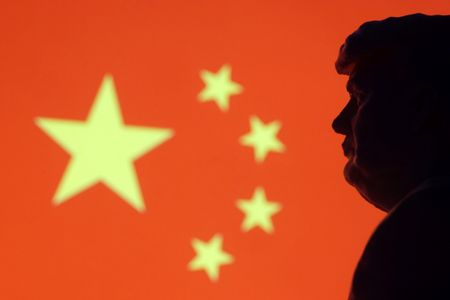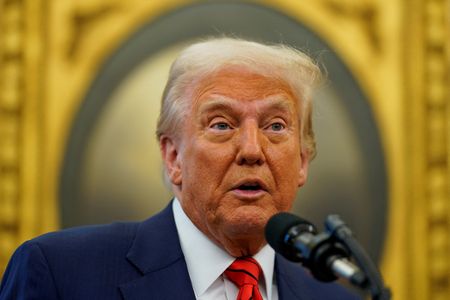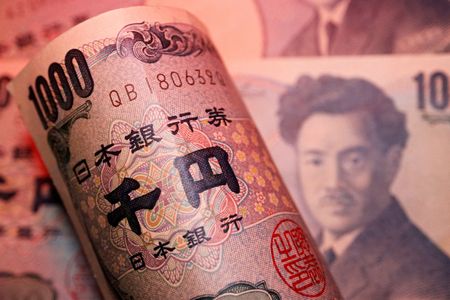By David Lawder, Helen Reid, Lisa Baertlein and Lisa Barrington
WASHINGTON/LONDON/LOS ANGELES (Reuters) – U.S. President Donald Trump paused his administration’s repeal of duty-free treatment of low-cost packages from China on Friday, giving the Commerce Department time to make the order workable, after the rapid change created disruptions for customs inspectors, postal and delivery services and online retailers.
The eventual cancellation of de minimis means the more than 1 billion small-value e-commerce packages arriving annually in the United States with goods coming directly from China must switch to an entry process that requires additional information and duties, adding time and cost.
The stop and restart of the United States Postal Service acceptance of those packages this week set off a swarm of disruptions that backed up Customs clearance for packages – even those that had paid duties – at New York City’s John F. Kennedy International Airport.
“Well that was a fun Tuesday through Friday, if you work in global e-commerce,” said Derek Lossing, CEO of e-commerce and global supply chain firm Cirrus Global Advisors.
The initial change, implemented with just over 48 hours’ notice, caused the USPS to temporarily stop accepting packages from China and Hong Kong earlier this week.
Popular online retailers including Shein, Temu and Amazon.com’s new Haul service send packages directly from Chinese factories to U.S. shoppers and use de minimis to keep prices low. Those retailers did not immediately respond to requests for comment.
The Trump administration’s revision to the order was signed on Wednesday and published on Friday, a White House spokesperson said.
De minimis, a legal term referring to matters of little importance, refers to the U.S. waiver of standard customs procedures and tariffs on items worth less than $800 that are shipped to individuals from foreign countries.
Temu and Shein combined ship around 9,000 metric tons of cargo worldwide every day, or approximately 88 full Boeing 777 freighters, said Niall van de Wouw, chief air freight officer at freight pricing platform Xeneta.
“You cannot suddenly put up the shutters to this volume of air freight, so it is no surprise there has been a delay to the executive order on de minimis.”
PACKAGES PILE UP
U.S. Customs and Border Protection, which has the job of screening e-commerce packages and collecting duties on them, held a meeting on Thursday with logistics professionals to discuss the status of more than a million packages piling up at JFK Airport, according to a source familiar with the meeting.
One logistics executive on Friday told Reuters that customs had begun releasing packages it was holding at JFK, which has been taking in about 60 million de minimis e-commerce packages annually.
Trump scrapped the duty-free treatment for Chinese goods with the stated aim of stopping the flow of fentanyl and precursor chemicals into the United States.
White House officials have said Canada and Mexico are conduits for shipments of fentanyl and its precursor chemicals into the U.S. in small packages that are not often inspected by customs agents. While fentanyl traffickers have exploited a U.S. trade law, public data shows 0.2% of all fentanyl seized in the U.S. comes from the Canadian border, while the vast majority originates from the southern border.
Many shipping experts and attorneys warned that switch would overwhelm customs inspections because the agency does not have systems and processes in place. Its staff are also stretched thin because they fall under the U.S. Department of Homeland Security, which also is responsible for border security.
Companies like Shein and Temu had halted some air cargo flights, invoking force majeure to cancel agreements without penalties, said Kathy Liu, director of global sales and marketing at Asia-focused freight forwarder Dimerco.
U.S. shoppers also got hit with bills for duties on purchases of dresses, tops and baby clothing that previously were exempt. It is not immediately clear whether those consumers would be eligible for refunds for any duties paid.
“We’re navigating these significant changes to U.S. trade policy as they come, as best we can on behalf of our clients,” said Brian Bourke, global chief commercial officer for SEKO Logistics, which moves e-commerce packages targeted with new duties.
That echoed the comment from delivery firm DHL. Its rivals UPS and FedEx did not immediately comment.
(Reporting by Brendan O’Brien in Chicago and David Lawder, Helen Reid in London and Lisa Baertlein in Los Angeles; Editing by Caitlin Webber, Andrea Ricci, Diane Craft and Rod Nickel)











